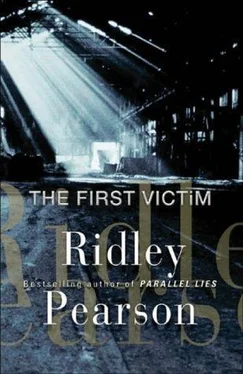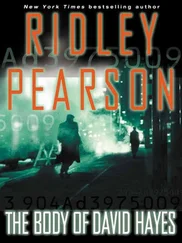Ridley Pearson - The First Victim
Здесь есть возможность читать онлайн «Ridley Pearson - The First Victim» весь текст электронной книги совершенно бесплатно (целиком полную версию без сокращений). В некоторых случаях можно слушать аудио, скачать через торрент в формате fb2 и присутствует краткое содержание. Жанр: Триллер, на английском языке. Описание произведения, (предисловие) а так же отзывы посетителей доступны на портале библиотеки ЛибКат.
- Название:The First Victim
- Автор:
- Жанр:
- Год:неизвестен
- ISBN:нет данных
- Рейтинг книги:3 / 5. Голосов: 1
-
Избранное:Добавить в избранное
- Отзывы:
-
Ваша оценка:
- 60
- 1
- 2
- 3
- 4
- 5
The First Victim: краткое содержание, описание и аннотация
Предлагаем к чтению аннотацию, описание, краткое содержание или предисловие (зависит от того, что написал сам автор книги «The First Victim»). Если вы не нашли необходимую информацию о книге — напишите в комментариях, мы постараемся отыскать её.
The First Victim — читать онлайн бесплатно полную книгу (весь текст) целиком
Ниже представлен текст книги, разбитый по страницам. Система сохранения места последней прочитанной страницы, позволяет с удобством читать онлайн бесплатно книгу «The First Victim», без необходимости каждый раз заново искать на чём Вы остановились. Поставьте закладку, и сможете в любой момент перейти на страницу, на которой закончили чтение.
Интервал:
Закладка:
The base’s hasty remodel by the INS had come as a boon to the chain-link contractors in King County. Boldt pulled his department-issue Chevy Cavalier to a stop at the guard gate. He and Daphne Matthews displayed their badges and stated their business. In the far distance a man wearing khakis and a lime green crew shirt made a nice chip shot onto the green. Attorneys and government employees came and went with regularity at Fort Nolan, but a pair of Seattle cops was clearly something new, for the guard studied their identification badges carefully and, asking Boldt to pull over inside the gate, made a phone call. They were provided an over photocopied map of the facility upon which the guard hastily drew directional arrows. Daphne navigated.
‘‘Shouldn’t John be with us?’’ Daphne asked. ‘‘In fact, shouldn’t you be at the office and John be here?’’
‘‘He’s lead. He gets the joy of the paperwork,’’ Boldt replied.
‘‘Are we in denial of our rank, Lieutenant?’’
‘‘Hill and I disagree as to the job description,’’ Boldt said. ‘‘Let’s just leave it at that.’’
‘‘Will she leave it at that? Would you have tolerated Phil Shoswitz in the field?’’
‘‘It’s different.’’
‘‘Why? Because it’s you, not Shoswitz?’’
‘‘Exactly.’’
‘‘Have you heard the term bullheaded ?’’
‘‘Are you familiar with the word experience ?’’ he fired back at her.
‘‘I certainly am. And my experience,’’ she said, intentionally cutting him, ‘‘is that both you and Hill are bullheaded. Something’s got to give there-and she’s got rank on you, Lieutenant.’’
Boldt pursed his lips and pulled up to the curb. She shot a look at him that could have caught a bush on fire.
The interview room, plain and bare, contained two long metal tables with Formica tops surrounded by metal chairs with worn plastic cushions. On the wall hung framed portraits of the president and the regional INS director, Adam Talmadge. The interpreter was a Japanese-American woman in her forties who stood five feet tall in shoes with heels and dressed with a simple elegance.
The detainee was young and silently defiant. Her head and eyebrows were shaved, lending her an otherworldly look. She wore over-washed denim pants and a thin denim shirt with no bra. Her blue rubber sandals slapped the gray cement floor in a steady, insistent rhythm. An aide delivered four cups of tea.
Boldt cupped his hand and whispered to Matthews, ‘‘Do you recognize her?’’
‘‘No,’’ Daphne answered. ‘‘But I only saw photos.’’
‘‘Yeah? Well I was there, and she. . I don’t know.’’ Boldt went through the formalities of introductions. Through the interpreter he attempted to explain that the police had no interest in pressing charges against this woman or any of her companions. Then, pen ready, he said to the interpreter, ‘‘Please tell her we need the name of the ship that transported the container.’’
The interpreter told him, ‘‘You’ll never get that out of her. To give you that would put not only her at risk, but her relatives here and at home. Perhaps agent Coughlie should brief you before-’’
‘‘Translate the question, please,’’ Boldt said, interrupting.
‘‘Wait!’’ Daphne interjected, catching the interpreter’s warning eye. She whispered into Boldt’s ear.
He shrugged and deferred to her saying, ‘‘Go ahead.’’
Daphne addressed the detainee, ‘‘You paid a great deal of money to be brought to this country. What if we could get that money back for you, erase that debt?’’
Boldt wrote on his pad where Daphne could read it: smart .
The Chinese woman replied through the interpreter, ‘‘Yes. We pay money to be brought America. We in America. Yes?’’
‘‘She’s an illegals poster child,’’ Boldt mumbled.
Daphne tried another tactic. ‘‘What if we arranged for you to remain in the United States legally? Would you help us then?’’
The interpreter interjected, ‘‘I will not be party to this kind of sham.’’
‘‘What sham?’’ Daphne argued.
‘‘The Service will never agree to such a deal. Have you spoken to Agent Coughlie? Of course you haven’t! Brian Coughlie never makes such deals.’’
Boldt inquired, ‘‘Then how do they obtain information from these people?’’
‘‘Listen, I’m only the translator, but I’m telling you: I’ve never offered a deal to any female detainee. It just isn’t done. The operating premise is that the women don’t know anything. They are rarely, if ever, even interviewed. The male detainees, the various gang members occasionally rounded up-the coyotes-they’re a different story. But in terms of the women, Fort Nolan is nothing but a big bus terminal, with all the buses headed home.’’
‘‘All the more reason she should cooperate with us,’’ Boldt reminded. ‘‘We’re giving her a chance to be heard.’’
‘‘But you don’t control their destiny, the INS does. Agent Coughlie does.’’
The subject’s eyes ticked back and forth between her interpreter and Boldt, who was beginning to dislike Coughlie already.
Daphne said politely, ‘‘Please translate the lieutenant’s offer. If we cut her a deal that included a legitimate green card and her money returned, could she supply us with the name of the ship and any details of crossing?’’
The translator spoke quickly behind poorly contained anger. The detainee listened carefully, looked surprised and then studied both Boldt and Daphne carefully. After a long hesitation, she shook her head no.
‘‘Why,’’ Daphne pleaded. ‘‘Why volunteer for deportation?’’
The interpreter answered, ‘‘Because-’’
Boldt chided, ‘‘Not you. Her!’’
The Chinese woman shook her head a second time upon hearing the translated question.
The interpreter tried again with Daphne. ‘‘They are warned before they leave the mainland that the Americans do not keep their word. Their relatives, both here in the US and in China, will suffer if they talk. To a Chinese, family is everything. It would be shameful to put any family member at risk.’’
Boldt addressed the translator. ‘‘The people who took her money nearly killed her. They did kill three others. More will die. Maybe relatives of hers who follow in her footsteps. Doesn’t that mean anything to her?’’ He hesitated, leaned forward and warned, ‘‘Tell her that we will arrest her as an accomplice to those deaths if she does not cooperate.’’ This drew Daphne’s attention as well. He continued, ‘‘Tell her that if convicted she will not be deported, but will spend the rest of her life in a prison with convicted murderers, drug addicts and thieves. Exactly that. Exactly those words, please.’’
The color had drained out of the translator’s face; her eyes pleaded with Daphne for intervention.
But Daphne nodded at Boldt.
‘‘You wouldn’t do this,’’ the interpreter objected.
‘‘Not another word from you,’’ Boldt fired back, ‘‘other than what comes from her or one of us. No more editorial. Three women are dead ,’’ he repeated loudly, now getting his earnestness across to the subject as well. ‘‘Now translate!’’
The interpreter spoke to the woman, who subsequently blanched at the idea of a prison term. After a long and searching staring match with Boldt, this woman addressed her translator, who, upon hearing
the words, suppressed a smirk.
‘‘What?’’ Boldt asked impatiently. ‘‘And I want it word for word.’’
The translator did her job. The Chinese detainee smiled, for the first time without using her hand to shield her mouth. Her front teeth were missing.
Читать дальшеИнтервал:
Закладка:
Похожие книги на «The First Victim»
Представляем Вашему вниманию похожие книги на «The First Victim» списком для выбора. Мы отобрали схожую по названию и смыслу литературу в надежде предоставить читателям больше вариантов отыскать новые, интересные, ещё непрочитанные произведения.
Обсуждение, отзывы о книге «The First Victim» и просто собственные мнения читателей. Оставьте ваши комментарии, напишите, что Вы думаете о произведении, его смысле или главных героях. Укажите что конкретно понравилось, а что нет, и почему Вы так считаете.












